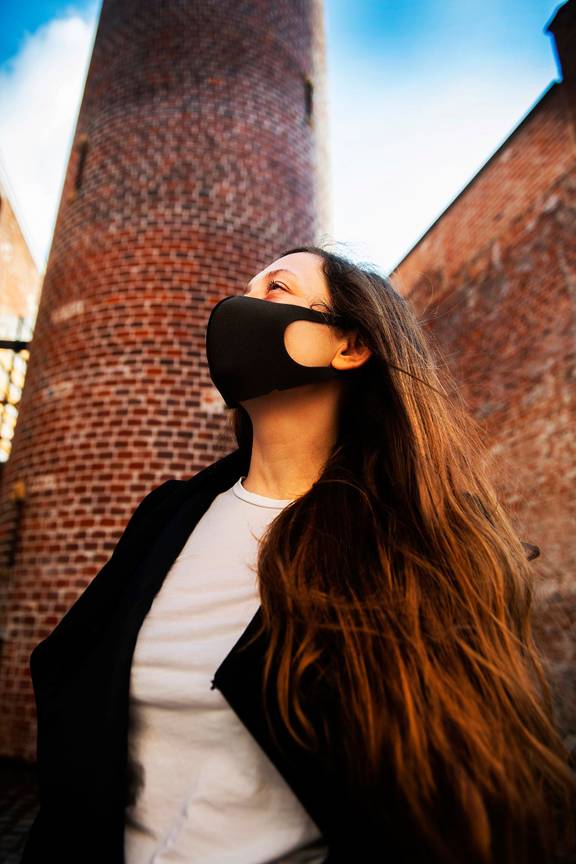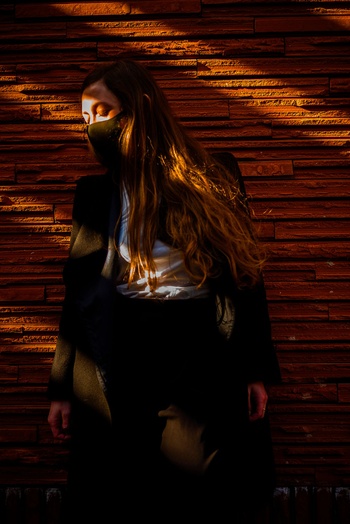Like a fragmentation bomb that smashes the illusion of the single self to smithereens, Ariane Loze also breaks all the rules of artistic creation with “Ariane Loze, parlez-nous over jezelf”. This performance-manifesto, which is both a studio visit and a workshop that is open to the public, takes place at Centre Tour à Plomb.

© Ivan Put
| Ariane Loze: “It is common for us to fool people by presenting a unique and coherent self to others when, on the inside, we are full of contradictions.”
Ariane Loze: 'I am here in person, waiting for you'
To say the least, Ariane Loze (born in Brussels in 1988) has not been idle over the past few months. First, she had to mourn the loss of the residence that she had started in New York. She returned on 20 March 2020 and has not forgotten the chilling journey from Zaventem to Brussels. “From the airport to the city centre, I didn't see a single car,” she recalls.
Following a few months of inactivity over the summer, which prolonged the lethargy of the first lockdown, she returned to action in September. She began work on a project to transform two of her films, Mainstream (2019) and Le banquet (2016), into a play about management and its formidable lexical field based on profit. “If you can target, that's good, but it's even better to challenge,” she says, ironically. Loze knows this newspeak well: her skills as an actor have been employed in role playing for business training. She recalls, “I saw managers become exhausted, stuck between a rock and a hard place. Those coaching mornings oozed weariness, fatigue… I observed this societal ailment like a sociologist.” She also highlights the perverse effects of financial jargon: “Wittgenstein had the right idea when he wrote that 'Die Sprache ist die Mutter, nicht die Magd des Gedankens,' meaning 'Language is the mother, not the servant of thought.' The thoughts we have are the result of the words we use. What's more, we often use them because other people say them, resulting in the homogenisation of thought.”
Since my play cannot be premiered, I am determined to put it on, even if only for one person
Co-written with the author Nina Léger, Bonheur entrepreneur represents a return to her roots for the artist, who originally studied directing at the RITCS in Brussels. She had drifted away from theatre. Since 2008, her MÔWN (“Movies on my own”) have made her known to a wider audience. In this series of films, which has circulated on the contemporary art circuit, the artist performs every role, from costume designer to editor. As an actor, she plays a multitude of characters. Her many transitions are achieved through the use of clothes taken straight out of a lost-and-found, and the skilful rearrangement of her hair. Ariane Loze acts as a cinematic one-woman-band.
“To begin with, I tried my hand at this form of expression in order to learn about the narrative principles of film. I filmed little sketches in which I played several characters. People saw that there was real potential in this form. Over time, my work has followed the history of film; I began with experimental silent sequences; they now contain dialogue. But I have not yet reached the stage of filming in movement; all the shots are static. The work requires a level of compliance from the spectator that is similar to what happens at the theatre: I ask them to be willing, to really want to believe,” she explained to us in 2018 during the filming of L'Archipel du moi at KANAL – Centre Pompidou.
A change to the programme
By a twist of fate, it was also KANAL that was due to present Bonheur entrepreneur. The work was supposed to be performed on 26 and 27 February. Once again, there was a change of plan. “I was rehearsing in Paris last autumn, at the Théâtre de la Cité Internationale, because I was expecting to work there in late 2020, early 2021. The show was looking great because an amazing technical team, who had become available because of delays to the programme, helped me. Unfortunately, in January, I realised that it was over, that the virus and its variants had made my project impossible. It was very discouraging. Nothing made sense any more. I told myself that I would spend the rest of the winter in my bed,” says the thirty-something-year-old, whose work has a Rohmerian freshness.

© Ivan Put
Loze, who completed a residence in 2016 at the HISK in Ghent, decided to bounce back, finding her energy once more. She took advantage of the carte blanche offered to her by the Tour à Plomb centre of culture, sport, and learning, which was founded on ideas about locality and emergence, near the Arts et Métiers district in a former nineteenth-century industrial site in the shadow of an impressive 46-metre-high brick chimney. Ariane Loze completely changed the contents of the programme. The video-maker explains: “It happened a week before the opening. I was on the train to Veurne. I had a sort of moment of inspiration. I told myself that it was out of the question for me to stop working because there was a spanner in the works. I refuse to accept this technological health-policy confinement. I decided that, since only exhibitions were permitted, I would make an in situ piece, transforming what was going to be simple film screening into an open workshop.”
All fired up, Loze produced her “Manifesto of the in-person studio” immediately afterwards. Extract: “Places to meet now no longer exist in the city. So, now they are called exhibitions. What I want, personally, as an artist, today, is to meet people. In real life, en présentiel, as the absurd neologism puts it so well. I don't want to do anything remotely or at a distance any more. I won't phone people any more. I'm done with Zoom. I will no longer be a part of Teams, don't googlemeet me. I will be present in the space to meet you, to share the projects I am working on, my questions, my ideas, the videos I have not yet finished, the drawings I will do, my first watercolours, everything! We will speak from 1.5m apart, wearing masks, by reservation. I will be there. Every Friday in March. I'm waiting for you.”
If there is only one
It was in the beautiful performance venue, situated in what was once the foundry where lead was made for making weapons, that we met with Ariane Loze as she was preparing her highly unusual exhibition. “Ariane Loze, parlez-nous over jezelf” is a new kind of show that combines film, theatre, and performance to produce dizzying metatheatre. The visitor is presented with a big screen on which five of the artist's short films are projected and, behind the white canvas, on a completely different level, that of reality, Ariane Loze herself rehearsing her play. “As if they have been invited onto a filmset while shooting is in progress, the spectator is able to observe different characters coming to life,” explains the video-maker-performer, lifting the curtain to reveal what lies behind the scenes of her practice. “How do we now meet people, how do we talk to each other, how do we share? The city no longer holds the answers to these questions. There is not one single public space in which those functions are fulfilled. I therefore needed to create something more radical. Since my play cannot be premiered, I am determined to put it on, even if only for one person,” says the artist, who is also mother to a little boy of ten. In fact, Loze has chosen to create a performance that is almost individually tailored, using a control desk to screen the film that is best suited to the visitor.
The set consists of a big table covered by a cloth on which plates, cutlery, and glasses are set. It is within this strange “Last Supper” that the four characters, all played by the artist, interact. Around her gravitate a cinematographer, who directs the camera and controls the lighting, and a drummer, Steve Argüelles, who provides the soundtrack for the piece. There is one more crucial detail: a clothes rail on which hang the multiple costumes that enable her to assume the different parts.
I don’t want to do anything remotely or at a distance any more. I won’t phone people any more. I’m done with Zoom.
For the screenings, the artist, in agreement with Stéphane Roy, the coordinator of the centre, chose films (Profitability (2017), Utopia (2018), Inner Landscape (2018), Otium (2019), and L'Archipel du moi (2018)) that are typical of her spare works, which are characteristically made using limited equipment: a reflex camera on a tripod, a fairly dated 50mm lens, a monitor, and sometimes a light reflector. The selection speaks volumes about the “Loze method”, which is largely based on constraint. Aside from her technical asceticism, she very often restricts herself to a specific place: a slag heap in the Genk region in Inner Landscape, the Belgian pavilion at the Venice Biennale of Architecture in Utopia, which gives a unity to the work. The constant improvisation galvanises the dialogue. Ariane Loze forbids herself to write anything in advance in order to keep her narration free. Then, there is her determination to play all the characters. Initially born out of necessity, this approach then became consubstantial with her desire to make the different voices that resound within us heard, an intent that could be described as political. Too often, we silence that inner polyphony, which is the surest path to the “us”, in order to fit in with the “identity crises” disturbing the world.
“It is common for us to fool people by presenting a unique and coherent self to others when, on the inside, we are full of contradictions. These scenes with several characters also reveal the potential that we have to be everything that we are not. What happens when the 'self' that must assert itself is multiple and when the different parts of that self do not align? A repudiation of fixed and monolithic identities, my videos hint at what makes human beings so rich: a plural, multiple, fluid, open identity.”
ARIANE LOZE, PARLEZ-NOUS OVER JEZELF
> 27/3, Centre Tour à Plomb, touraplomb.be
www.arianeloze.com
Read more about: Expo